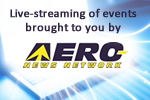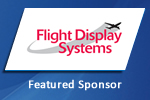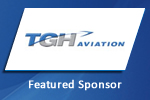|
April 7, 2010
AEA's Fast Traks provide convention attendees a wide range of learning opportunities, including professional development, regulatory, technical and business management training. Your choice of any of the following is included with a full convention registration. Get up-to-speed with AEA's Fast Traks!
All sessions are approved for credit toward
AEA’s Avionics Training Excellence Award and the FAA’s IA
renewal and AMT awards.
 View FAA course acceptance letter View FAA course acceptance letter
 IA refresher training certificate IA refresher training certificate
- Morning Traks
- Afternoon Traks
- Full-Day Traks
8 a.m. to Noon (4-hour session) - Miami 3
Weather Radar Training Course
Presented by TexasGYRO
TexasGYRO, an FAA Part 145 repair station in Fort Worth, Texas, specializing in flight-line and bench repair of airborne weather radar systems, has designed a course specifically for avionics technicians to better understand the history, theory and operation of airborne weather radar systems used in general aviation aircraft. Course objectives include:
- History and theory of GA weather radar systems
- How weather radar systems operate from the pilot’s perspective
- Flight-line troubleshooting and repair of GA weather radar systems
- How to properly interpret the pilot’s complaint, discrepancy and squawk
- Radar stabilization and how to perform a radar stabilization alignment
8 a.m. to Noon (4-hour session) - Sanibel 3
New Parts Manufacturing Rule Impacting Distributors, Repair Stations, Manufacturers
Presented by Jason Dickstein of the Washington Aviation Group
The FAA has made significant changes to manufacturing quality systems, parts marking and requirements for parts manufacturing authority (PMA) with its recent revision to Part 21. The FAA’s regulatory reach increases with the recent introduction of 14 CFR, Part 21.9. Due in April 2010 and the subject of FAA-hosted training sessions, new advisory material and a host of concerns for parts manufacturers and distributors, Part 21.9 has far-reaching implications that will change the landscape for “commercial parts” and repair station-produced parts. If you are in the repair station, manufacturing or distribution business, this regulatory session is of utmost importance for learning the new regulatory framework under which parts manufacturing (including parts produced in the course of maintenance) and representation of parts for sale will be conducted.
8 a.m. to 10 a.m. (2-hour session) - Sanibel 1
ECS
Presented by Randy Dohs, EFB product manager
Covers electronic flight bag engineering, certification and installation kit provisions. Attendees will get an overview of an EFB installation and certification project.
8 a.m. to 10 a.m. (2-hour session) - Sanibel 2
EMS Aviation
Presented by Randy Chappell - Account Manager - Commercial Aero Products & Justin Steinke - Account Manager
Attendees will learn how to enable Airborne SmartPhone communications with Iridium and Inmarsat. This session covers EMS Satcom’s eNfusion broadband system and EMS Sky Connect’s Forte product line.
10 a.m. to Noon (2-hour session) - Sanibel 1
ICG
Presented by Joshua Grippo, technical support supervisor
ICG presents an overview of its NxtMail server, which enables BlackBerry and iPhone PDA e-mail connectivity via Iridium and broadband systems. This session covers product features and operation, as well as integration information to ICG’s Iridium systems. Latest updates, including broadband connectivity and the Sora SBB integration, also will be covered.
10 a.m. to Noon (2-hour session) - Sanibel 2
L-3 Avionics Systems
Presented by William Tramper, field service engineer
The Trilogy ESI Series installation and flightline maintenance training course begins with a general introduction to the ESI and MAG 3100 systems and is followed by in-depth installation guidelines and flightline maintenance procedures. Troubleshooting the system is easy with the intuitive status messages, which also are covered in the training. With the addition of the internal battery, the ESI training course now features information on the ESI-2000 and the battery technology, performance and maintenance.
1 p.m. to 5 p.m. (4-hour session) - Sanibel 3
Canadian Civil Aviation Regulations (CARs) for U.S. Repair Stations
Presented by John Carr, AEA Canada Regulatory Consultant
The U.S./Canadian Bilateral Aviation Safety Regulations and the maintenance implementation plan allow aircraft of all sizes and shapes to cross the North American border while shopping for maintenance organizations to install and service avionics and avionics systems. The one caveat in all cases is, the maintenance organization performing the work must perform the work to the standards of the aircraft’s state of registry. For Canadian aircraft, a U.S. repair station is allowed to perform maintenance, repair and alterations on Canadian-registered aircraft provided the repair station follows Canadian regulations and is specifically authorized by the FAA with a Canadian supplement to its repair station manual. This session reviews the repair station manual supplement, which is required before working on Canadian-registered aircraft, as well as the basic Canadian avionics maintenance regulations and the Canadian avionics modification regulations.
1 p.m. to 5 p.m. (4-hour session) - Miami 3
Electrical Load Analysis
Presented by Al Ingle of Capital Avionics
The primary purpose of the electrical load analysis (per ASTM Designation: F2490-05) is to determine the electrical system capacity (including generating sources, converters, contactors, bus bars and more) needed to supply the worst-case combinations of electrical loads. This is achieved by evaluating the average demand and maximum demands under all applicable flight conditions. Then, a summary can be used to relate the ELA to the system capacity and establish the adequacy of the power. Created from the guidance in ASTM F2490-05, this course takes the technician through the basic principles behind electrical load analysis and the procedures for preparation of a load analysis. The course uses examples from single-engine and twin-engine aircraft in real-world scenarios.
1 p.m. to 5 p.m. (4-hour session) - Sanibel 2
Enhanced Airworthiness Program for Airplane Systems (EAPAS) Training
Presented by Massoud Sadeghi, EAPAS program manager
During the late 1990s, the FAA and industry determined they needed a better understanding of wire-related failures that could result in arcing, smoke in the cabin or flight deck and sometimes onboard fires. The FAA’s Enhanced Airworthiness Program for Airplane Systems (EAPAS), established in 2001, has been developing enhancements for continued safety of aircraft wiring systems from their design, installation and maintenance throughout their operational life. The EAPAS program led to a proposed rule in October 2005, which viewed aircraft wiring as important systems on their own. The rule proposed to revise current maintenance practices and specified other actions to address issues of aging and degradation in wiring. The final rule, comprehensive in addressing all aspects of electrical wiring design, installation and maintenance for transport airplanes, was published in November 2007. It is the result of recommendations made by industry groups working with the FAA and international authorities to increase the safety of airplane electrical wiring systems. This four-hour familiarization program, presented by the FAA, is essential (and required for many AEA members) for shops specializing in maintenance of large transport category aircraft.
1 p.m. to 5 p.m. (4-hour session) - Miami 1
Hands-On Pitot Static & Transponder Certification Testing with Transponder Tune-up
Presented by Don Dominguez, Radioman Avionics
Learn the proper methods for conducting pitot/static and transponder certification testing. This course offers hands-on training, including a regulatory review and an explanation of the proper administrative procedures for completing these critical certifications. The contents of this course could be incorporated easily into approved training programs for certified repair stations. Course objectives include:
- Regulatory Review: 91.411 and 91.413; FAR 43 Appendix E and F; Far 43.9 content form and disposition of maintenance and alterations records review
- Technical Review: Step-by-step pitot static/transponder inspection training from set-up to final documentation; time-saving tips for conducting testing in a logical order; Appendix E and F management training
- Additional Training: Course materials with step-by-step procedures, sample checkout forms and FAR reference material; standard practices; tips and tricks from experienced industry technicians; hands-on transponder training, including alignment, troubleshooting procedures and common maintenance practices
1 p.m. to 3 p.m. (2-hour session) - Sanibel 1
Cobham Avionics, Integrated Systems
Presented by Robert DuRall, senior manager of customer support
This course provides guidance on the installation, maintenance and operation of the Cobham Avionics HeliSAS system. Attendees will obtain general knowledge on the criteria for location of components and integration to other systems. Post-installation testing, alignment, troubleshooting and basic operation will be included.
3 p.m. to 5 p.m. (2-hour session) Tallahassee 2-3
AEA Regulatory Brief
Moderated by Ric Peri, AEA’s vice president of government and industry affairs
Wi-Fi Summit Update
The Aircraft Electronics Association recently hosted a Wi-Fi Summit for industry participants involved in certifying and installing Wi-Fi equipment into aircraft. At the conclusion of the two-day event, the AEA and the FAA made a number of commitments, including moving the "new and novel" Issue Paper for wireless technology to a formal guidance document. A formal guidance document would help clarify and simplify the processes and procedures for certification and installation of these systems. This Wi-Fi Summit Update session will provide an update on the progress of the recommendations, including the guidance material for Wi-Fi installations as well as highlight computer security issues not addressed during the summit.
AML-STCs: Now and in the Future
The FAA's Small Airplane Directorate is presenting an overview of their findings and recommendations from a recently completed Part 23 Certification Process Study. This study reviewed the adequacy of current airworthiness processes throughout a small airplane's life including pilot training, operations, and maintenance. The FAA is planning to update Part 23 for the first time in over 25 years and is asking for your input before beginning the formal regulatory review process. Specifically, the FAA is looking out over the next 20 plus years and asking for input on processes that need improvement as well as disconnects between the certification process and how the equipment is used and maintained in operations.
3 p.m. to 5 p.m. (2-hour session) - Sanibel 1
Revue Thommen
Presented by Anupama Franklin, avionics systems engineer
The avionics engineers attending this session will first learn in detail about the Thommen AC32 advanced SW 2.7 version, which incorporates the requirements of many specific applications not covered in previous versions of the AC32. These include software iterations resulting from troubleshooting experiences. Since the AC32 has become an industry standard for digital cockpit integrations of glass cockpit manufacturers who do not have their own ADC, the focus of this seminar is to share technical experiences from integrations done with the Universal Avionics 890R system, as well as Sagem and Chelton EFIS products.
8 a.m. to 5 p.m. - Sun 5
Avidyne Avionics Training
Presented by Keith Berry, technical training manager
For dealers who sell, install, service and/or troubleshoot any Avidyne product, this full-day distributor product technical training includes the following:
- Entegra IFD Series: Entegra Release 9 IFD service and support training, including an overview of the Entegra Release 9 integrated flight deck system’s features and functions, as well as the latest enhancements, such as IFDs configurations, set-up, troubleshooting and servicing procedures.
- Entegra Flight Control Series: DFC90 and DFC100 attitude-based flight control system overview and installation techniques, including both the DFC90 and DFC100 autopilot features and functions with some installation, configuration and troubleshooting techniques.
- Entegra MFD Series: EX600 MFD overview and installation techniques, including the Entegra EX600 MFD features and functions along with installation, configuration and troubleshooting techniques.
- Entegra TAS Series: TAS600 Series traffic advisory system installation techniques and tips, including the TAS600 Series system planning and installation considerations, configurations, performance testing procedures and troubleshooting techniques.
- Entegra Wx Series: MLX770 two-way data-link transceiver installation techniques and tips, including the MLX770 planning and installation considerations, MLX770 installation checkout, WSI subscription procedures, and troubleshooting techniques.
8 a.m. to 5 p.m. - Sun 3-4
Garmin Avionics Training
Presented by Mike Berryhill, aviation product trainer
In support of its dealers and training requirements of 14 CFR, Section 145.163, Garmin and the AEA are presenting this full-day technical training session, which features topics such as the G600, G1000 and GTS 8XX traffic system. Time also will be provided for Q&As and discussions, as well as previews of new product announcements from Garmin. Key segments include:
- G600/G500: This session covers all facets of the G600/G500 installation, including, but not limited to, the GAD 43 AHRS autopilot adapter; SVT synthetic vision enablement; the use and limitations of the AML STC; installation tips; interfaces; system configuration; and post-installation checkout.
- G1000: The G1000 presentation includes enhanced training for the G1000’s SD cards and their functions, updated software and configuration training, as well as a brief discussion of new G1000 LRUs. New database loading procedures and features associated with newer GDU software upgrades also will be covered.
- GTS 8XX: A presentation covering the installing and integration of the traffic system will be presented, as well as the AML STC and new GTX 8XX install tool software.
- Light sport and portables: An introduction to the G3X glass flight display system, including hints and tips for installation and configuration of the G3X. There also will be a short presentation on the Garmin 695/696 and aera portable products.
- Service bulletins: Garmin will offer a segment covering the most pertinent service bulletins and alerts, as well as product updates.
8 a.m. to 5 p.m. - Sun 6
Customer Service to Drive Sales
Presented by Jodie Brown of Summit Solutions and Holly Simon of Smart Transformation
Employees value customer service with sales skills. They want to feel confident connecting with their customers while helping their company improve the bottom line. All employees help customers make purchases, whether or not they have a sales title. In this highly interactive workshop, attendees will learn techniques for providing exceptional customer service and building loyalty, including how to “read” a customer’s mind by asking the right questions at the right time; improving internal communications (handoffs) to provide exceptional service; getting information across professionally in e-mails and voicemails; dealing with difficult customers so they feel valued; and more. The instructors for this workshop have spent more than 20 years each in helping businesses exceed customer expectations.
8 a.m. to 5 p.m. - Sun 1
Aircraft Electronics Technician Certification Training
Presented by Richard Williams of Global Jet Services
This seminar is designed as a review for technicians who want to take the NCATT Aircraft Electronics Technician (AET) exam. It also serves as a good review for newer technicians who want to get a feel for the exam topics or for more experienced technicians who need to brush up on the fundamentals. The following are subjects to be reviewed during the full-day seminar: basic circuit calculations; DC (series, parallel, complex); AC (inductive, capacitive, resonant); basic circuit troubleshooting; component review (resistors, inductors, capacitors, transformers); power supplies and filters; wave generation shaping; digital review and logics; maintenance practices; safety hazcom; tech pubs; and wiring.
Last updated Thursday, April 1, 2010
|




